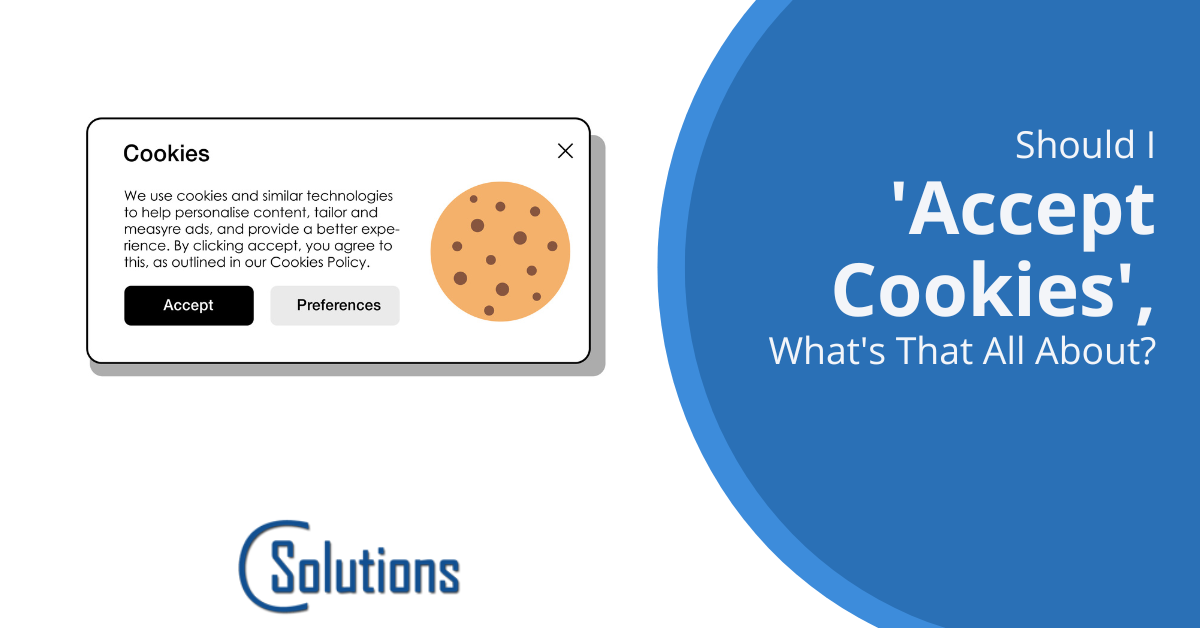Should I ‘Accept Cookies’, What’s That All About?

Cookies are ultimately necessary for parsing the Internet right now, yet they pose a risk to your privacy. About 40% of existing websites use cookie settings, yet over 70% of these cookie websites are not secure.
As a required criterion for online browsing, cookies assist web developers in providing you with more personalized, easy website visits. Cookies allow websites to remember your online persona – your website logins, shopping carts, and other information. They may, however, be a goldmine of private information for crooks to snoop on.
It can be difficult to maintain online privacy. Fortunately, a simple understanding of cookies can assist you in keeping prying eyes away from your internet sessions.
While the vast majority of cookies are safe, some can be used to track your online activities without your knowledge. Worse, genuine cookies can be used for privacy intrusion if a cybercriminal gains access. This is why you need quality IT services from experts to help you stay above these threats.
This article will explain much about how cookies are utilized and how to handle them.
What is a Cookie?
Apart from being tasty confectionaries, cookies are also computer files that aid enjoyable browsing in your life. In its most basic form, cookies are simple text files saved on your browsing device (PC, phone, or tablet) when you visit a website that uses cookies. It saves the website name and a distinct ID that shows you as the user.
Whenever you return to the webpage, it will acknowledge that you have previously visited it and respond accordingly. This implies that specific businesses will send their websites and services to you during subsequent sessions because they already know so much about you.
Types of Cookies
Below are the types of cookies according to function:
Session Cookies
These cookies are temporary, so they get deleted once you end that particular browsing session. These save bits of information such as what you searched for and where you last visited.
First-party cookies
These cookie types are saved on your computer, even after you end your browsing sessions. However, they expire after a while. These are mostly used to improve your online experience by automatically signing you in or remembering your choice for the retailer you last visited.
Third-party cookies
These cookies are similar to first-party cookies, but they are not designed or maintained by website owners. The people that create these cookies of this sort are called “information brokers.” They acquire your data while you go about your online activities and then make it available to marketers who use them to target users that have recently checked out their products.
What Kind of Information Do Cookies Store?
Every cookie contains the name of a website and an ID for you. Other websites will include additional information in the cookie stored on your computer. Below are some of the other information contained in cookies:
- The links you parse when using the website.
- The length of time you use a website.
- The choices, preferences, or settings you select.
- Tracking your visited sites.
A social network, for example, may employ cookies to track the links you visit and then utilize that information to present you with more relevant links in the future. On the other hand, a shopping website might employ cookies to remember the things you’ve placed in a virtual cart before checking out. Cookies are often used to enhance the user experience.
Any website can read cookies written by other websites, and they can easily be used to monitor your online surfing behaviors without you knowing, and this is a confirmed fact –many online ad networks do this. Cookies aren’t necessarily harmful, yet, they may be abused. As a result, discussions regarding cookies are frequently lumped in with other online privacy concerns.
Privacy Rules & Cookies
The European Union passed the General Data Protection Regulation (GDPR) in 2016, which went into force in May 2018. Following the 2002/2009 ePrivacy Directive, EU-hosted websites must get visitor authorization before monitoring them using cookies. Websites hosted in EU countries must conform to the following regulations:
- Before obtaining consent, provide information about what each cookie tracks.
- Request permission before utilizing any cookies that aren’t strictly essential.
- Maintain a record of site visitors’ consent.
- Allow visitors to utilize the site even if they refuse to accept specific cookies.
- Make it simple for visitors to withdraw their consent if they have previously granted it.
To comply with these restrictions, website creators add the cookie pop-up dialog that informs you about their cookie use and, in certain circumstances, asks you to choose to accept or reject specific cookies. Click this article to know what you need to know to stay above cyber threats at a home or business.
Simplify Your Online Security with Help from C Solutions
We at C Solutions IT want to ensure that you and your family can browse the Internet confidently. With more people doing remote work and children utilizing the Internet for school-related activities, you must secure your family and your information.
Contact us now to learn more about our different IT services. You can reach us by phone at 407-536-8381.
